
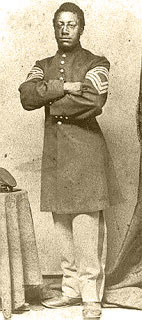 The
54th was organized in March 1863, since it was an all black
regiment except for it Leaders, and being the first black Regiment
to be organized in the northern States all eyes were on its
progress. If the performance turned out to be good, it would
be the deciding factor if Black's could be used in Battle. The
54th was organized in March 1863, since it was an all black
regiment except for it Leaders, and being the first black Regiment
to be organized in the northern States all eyes were on its
progress. If the performance turned out to be good, it would
be the deciding factor if Black's could be used in Battle.
The Men of the 54th Regiment was made up of mostly free blacks
from the Massachusetts and Pennsylvania areas, Among them was
two brothers Lewis & Charles Douglass who's father was a
famous ex-slave Frederick Douglass.
After Intense training and soon after arriving at Hilton Head,
South Carolina on June 3, 1863 , the Men of the 54th saw their
first action at James Island. The regiment earned its greatest
fame on July 18, 1863, but not to the good, for their unsuccessful
attack on the Confederate soldiers at Battery Wagner, cost them
the lives of nearly 54 men from the regiment and about 200 men
wounded among them were around 48 men never accounted for. Their
Leader died there shouting "Forward , Fifty-fourth!"
Later the 54th fought along with the 35th United states Colored
Troups at the the battle of Olustee ,although entering the battle
Late in the day the Union was saved fron total disaster by the
men of The 54th Regiment . As the men rushed into battle they
shouted " Three cheers for Massachusetts and seven dollars
a month ".
Before being mustered out in 1865, the men of The 54th regiment
fought in a few more battles one of them being the Battle of
Honey Hill. Now more than a centry after the war The 54th Regiment
of Massachusetts still remains the most famous black regiment
of the war , made well known even today by the movie Glory which
recounts The 54th Regiment prior to and including the attack
on Battery Wagner.
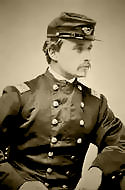 The Black Soldiers of the 54th Massachusetts Regiment
Of the Civil War
The Black Soldiers of the 54th Massachusetts Regiment
Of the Civil War
"After the passage of the Emancipation Proclamation The 54th
unit was organized by the governor of Massachusetts John A Andrew
and commanded by Colonel Robert Gould Shaw. The officers were
handpicked by Andrew himself and the men recruited by prominent
blacks such as Frederick Douglass. The 54th left Boston , Massachusetts
to fight for the Union on May 28 1863. "
Fifty-fourth
Regiment of Massachusetts Volunteer Infantry, which was the first
black army unit to participate in the Civil War," This is
there Story and the contribution they made to the war."
"The Fifty-fourth Massachusetts was organized in March, 1863
at Camp Meigs, Readville, Massachusetts, by Robert Shaw a 26 year
old from Boston. This regiment was composed primarily of free
blacks that volunteered from throughout the North, particularly
Massachusetts and Pennsylvania. Col. Shaw was a young white officer
from a prominent Boston family. He came from a family of strong
abolitionists. His father had founded the National Freedman's
Relief Association. Before entering the army 2 years before Shaw
was studying in the best school in Europe, but he was not the
best of students and did not practically like school and did not
want to continue his education there for he joined the army. Two
years later he was asked to head the first black regiment in the
Union, he turned down his first invitation in 1863 by Massachusetts
governor John A. Andrew, to head the 54th Massachusetts Regiment,
but then when asked again he accept and began recruiting men for
his new regiment and the first official regiment of black soldiers
in the Union Army."
"Many factors contributed to the importance of the 54th Massachusetts
Regiment. Forming this black regiment around the time of President
Lincoln's Emancipation Proclamation in the midst of the Civil
War represents gives one aspect of this importance. Comprised
of freed slave residing in the Northeast states departed from
the formation of other black regiments because the other black
regiments consisted of Southern blacks. The future of all black
regiments rested on the conduct of this black regiment in battle.
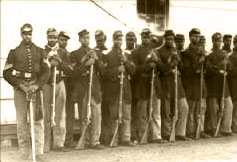 "
the few black soldiers who had fought thus far in the Civil War
had often done so with distinction, their service was scarcely
publicized. Initially, most of the newly recruited black regiments
were confined to support roles. Only after the Fifty-fourth Massachusetts
made a heroic and widely publicized assault in July 1863 on Fort
Wagner, South Carolina, were blacks given a wider role in fighting.
Even then, however, blacks were almost never allowed to become
officers. Black soldiers were also paid at lower wages than whites
until a protest by the Fifty- fourth Massachusetts prompted Congress
in 1864 to equalize salaries and issue back pay. Before Congress
complied, however, William Walker of the Third South Carolina
Volunteers was court-martialed, convicted of mutiny, and executed
for leading black soldiers in refusing to fight until pay was
equalized." Even twenty-six years after the end of the Civil
War and the heroics demonstrated by the black regiments, an undercurrent
of racism still existed. "
the few black soldiers who had fought thus far in the Civil War
had often done so with distinction, their service was scarcely
publicized. Initially, most of the newly recruited black regiments
were confined to support roles. Only after the Fifty-fourth Massachusetts
made a heroic and widely publicized assault in July 1863 on Fort
Wagner, South Carolina, were blacks given a wider role in fighting.
Even then, however, blacks were almost never allowed to become
officers. Black soldiers were also paid at lower wages than whites
until a protest by the Fifty- fourth Massachusetts prompted Congress
in 1864 to equalize salaries and issue back pay. Before Congress
complied, however, William Walker of the Third South Carolina
Volunteers was court-martialed, convicted of mutiny, and executed
for leading black soldiers in refusing to fight until pay was
equalized." Even twenty-six years after the end of the Civil
War and the heroics demonstrated by the black regiments, an undercurrent
of racism still existed.
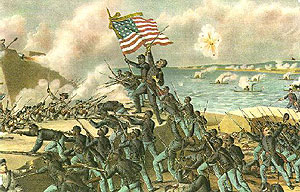 On
July 18, 1863, the regiment won undying glory by leading the bloody
assault on Fort Wagner near Charleston, South Carolina. In the
attack nearly half the regiment was killed, wounded or captured.
Colonel Shaw was among those who died.Sergeant William Carney
of New Bedford was wounded three times in saving the American
flag from Confederate capture. For his bravery in the battle,
he became the first black to earn the Medal of Honor, the nation's
highest military award. The survivors of the Fifty-fourth went
on to participate in the eventual capture of Fort Wagner several
weeks later. The Fifty-fourth continued to serve throughout the
remainder of the war. They fought at Olustee, Florida; Honey Hill,
South Carolina; and finally at Boykin's Mills, South Carolina.
By the end of the war, almost 179,000 African Americans served
in the Union Army and navy. Almost 3,000 died from battle wounds,
and 33,000 more died of disease. On
July 18, 1863, the regiment won undying glory by leading the bloody
assault on Fort Wagner near Charleston, South Carolina. In the
attack nearly half the regiment was killed, wounded or captured.
Colonel Shaw was among those who died.Sergeant William Carney
of New Bedford was wounded three times in saving the American
flag from Confederate capture. For his bravery in the battle,
he became the first black to earn the Medal of Honor, the nation's
highest military award. The survivors of the Fifty-fourth went
on to participate in the eventual capture of Fort Wagner several
weeks later. The Fifty-fourth continued to serve throughout the
remainder of the war. They fought at Olustee, Florida; Honey Hill,
South Carolina; and finally at Boykin's Mills, South Carolina.
By the end of the war, almost 179,000 African Americans served
in the Union Army and navy. Almost 3,000 died from battle wounds,
and 33,000 more died of disease.
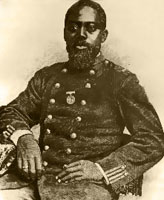 First
black soldier to receive the Medal of Honor First
black soldier to receive the Medal of Honor
Sergeant William H. Carney Civil War Hero 1840-1908
" When a soldier from another regiment offered to take the
flag so Carney could seek medical aid, he replied, "No one
but a member of the 54th should carry the colors!" Upon carrying
the flag back into camp after the battle, he received rousing
cheers from other units but simply replied, typically for a Medal
of Honor recipient, "I only did my duty."
On July 18, 1863, during the Battle of Fort Wagner, South Carolina
a hero is born.!
Over
180,000 black soldiers served in the union army during the civil
war, among them was the Men of the 54th Regiment. They were made
up from ex-slaves who wanted to join the union and fight to help
secure there freedom and the freedom of slaves not yet freed.
Among them was the first black soldier to receive the Medal of
Honor (William Harvey Carney ) , Born a slave in Norfolk,Virginia
, and studing to be a minisister decided the best way he could
serve his Lord and help his people would be to join the union.
he became a hero at 23yrs old when he saw that another colored
soldier that was carring the Flag in battle at Fort Wagner was
wounded. Never wavering and taking bullets as he ran , he took
the flag from the wounded soldier never letting it touch the ground,
and determined to only release it to someone from his regiment.
He shouted as he turned the Flag over to his comrades, ( "
The old Flag never touched the ground! " ) then he collapsed
from the wounds he had recieved. On that day William Harvey Carney
became an legionary hero , but would have to wait over three decades
before he would recieve it. Over 1,500 black troups died durning
the Battle of Fort Wagner,on July 18 1863.
In 1900 nearly 37 years after the Civil War, he was cited for
military valor.
Links
to some good information below
History of African-Americans in the Civil War http://members.tripod.com/~isaziz/africanh.htm
The Attack on Fort Wagner http://www.civilwarliterature.com/2Battles/TippooSaib/TheAttackOnFortWagner.htm
Black Bostonians and the Civil War: The 54th Massachusetts Regiment
http://www.nps.gov/boaf/54th.htm |